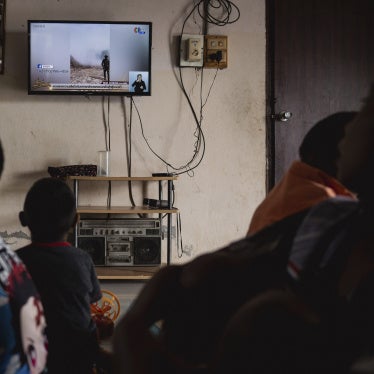Mr. President,
Distinguished members of the Human Rights Council,
Dear stakeholder representatives,
Ladies and gentlemen,
Human Rights Watch will now offer general comments on the Outcome Report of the UPR review of the People's Republic of China, as well as general comments on the review process itself, as set forth in the provisions of the document "United Nations Human Rights Council: Institution Building" adopted by the General Assembly on June 18, 2007.
The Universal Periodic Review of the People's Republic of China was a genuine test for the credibility of the recently established Human Rights Council. This is because China is the fourth permanent member of the UN Security Council to come under review, as well as an elected member of the Human Rights Council shouldering the obligation to "uphold the highest standards in the promotion and protection of human rights" (UN General Assembly resolution 60/251). So the extent to which the People's Republic of China would fulfill its requirement as a member of the HRC to "fully cooperate with the Council" (as set out in UN General Assembly resolution 60/251)-and the extent to which it would be candidly pressed by other members to do so-was bound to be a defining moment if the Council was to establish its authority, credibility and relevance.
But as it now stands, the Outcome Report raises serious doubts. The government of China has rejected, without a single exception, every recommendation made during the process that pertained to freedom of expression and freedom of association, independence of the judiciary, guarantees for the legal profession, protection of human rights defenders, rights of ethnic minorities, reduction of the death penalty, abolition of reeducation-through-labor, prohibition of torture, media freedom and effective remedies for discrimination. Can this be considered "upholding the highest standards in the promotion and protection of human rights" or "full cooperation with the Council?" Is this what we expect of a member in good standing of the Council?
Why couldn't the Chinese government answer any of the questions submitted in writing in advance of the session, or provide reasoning for the rejection of recommendations 27(b),(c),(d),(e),(f), (g), 28 (a), (c), (d), (e), (f), (g), (h), 30(b),(c), 31 (a),(b),(c),(d), 38, 42 (a), (b), (c),(d), 43(a),(b),(e),(f),(g),(h) 56 (a),(b),(c),(d), 79(a), (c), 81(b), 82 (a),(b),(c),(d),(e),(f),(g),(h),(i),(j), 83(a),(c),(d),(e), (g), 84(a), 85(b),86(b),(e), 92(b),(c),(d),(e),(f),(g), (h), 95(b), (c), (d), 96 (a), (b), (c), and 97?
The Outcome Report does list a number of recommendations accepted by the Chinese government, but almost all of them are broad statements of intent that offer neither acknowledgment of existing violations nor the establishment of remedies for such violations.
In addition, the Outcome Report also contains assertions that are manifestly so far removed from reality that they would immediately discredit any body that adopted them in a report. Such assertions include:
- "There is no censorship in the country" (Para. 71)-whereas any reference to the Beijing massacre on June 3-4, 1989, of peaceful protestors remains systematically suppressed 20 years later, China has the most expensive and extensive internet censorship system in the world and just this week the Chinese government issued a directive requiring computer manufacturers selling computers in China to pre-install censorship software;
- "No individual or press has been penalized for voicing their opinions or views" (Para. 71)-whereas criticism of the communist party can lead to arrest and sentencing, as illustrated by the 6 months detention of Liu Xiaobo for signing a document calling for political reforms;
- "There are no black jails in the country" (Para. 69)-whereas legal professionals, domestic and international media and researchers from state-run research institutes have documented and filmed some in the national capital;
- "There is no such thing as law enforcement organs using state secrets to suppress human rights defenders" (Para 104)-whereas Tan Zuoren faces state secrets charges for having compiled a list of names of children killed during the 2008 Sichuan earthquake;
- "The Chinese system of re-education-through-labor is similar to that of correctional service in other countries" (Para. 66)-whereas the government itself claims that its existence is an obstacle to China's ratification of the ICCPR (Para. 63) ; or
- "The amended law on lawyers contains clear provisions to protect lawyer's rights" (Para. 70)-whereas the country's once most prominent lawyer, Gao Zhisheng, has disappeared for over 6 months after having been taken into custody, while just last week over 15 prominent human rights lawyers have been victims of arbitrary disbarment on account of the "sensitive nature" of the cases they have represented.
It is also disturbing to see that, throughout the review, the Chinese government seems to have equated any expression of concern over the situation in Tibetan areas-where hundreds of detainees remained unaccounted for and where official documents reflect a judiciary so politicized as to preclude the possibility of delivering fair trials-as attempts to "politicize the issue" (Para. 111) that should therefore not be answered.
Mr. President, the Universal Periodic Review of the People's Republic of China was a genuine test for the Human Rights Council. But as the Outcome Report plainly reveals, all we saw was obfuscation, denial and off-hand rejection of recommendations and questions on issues that are clear for all to see--including some that have been established by earlier UN reports. We have seen a government that has refused to implement the very principles of the genuine "interactive dialogue" and "full cooperation" to which it had committed itself by becoming a member of the Council. China has failed this test in a sad indictment of its unwillingness to meet the aspirations of its own people for a more modern and accountable government. The UPR process relies on the good will of States. As a result, the HRC's credibity is severely challenged by those who do not have such will and undermine the process.








